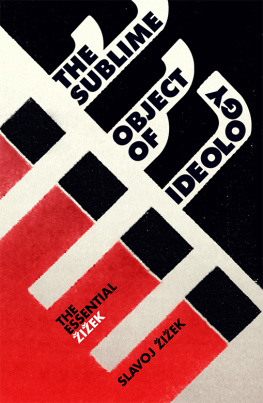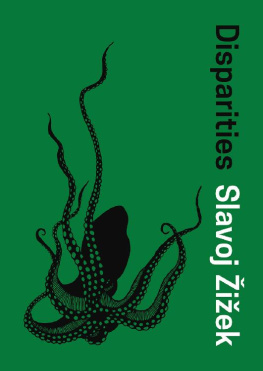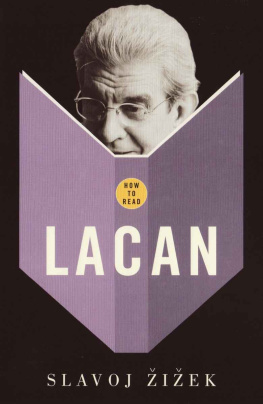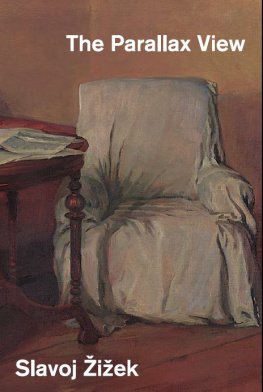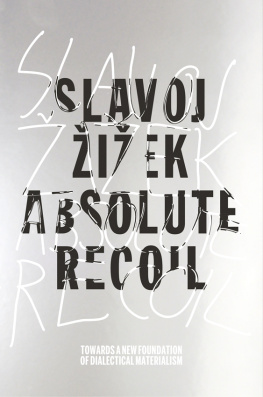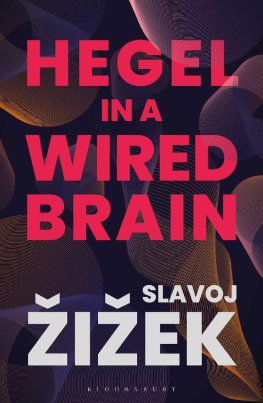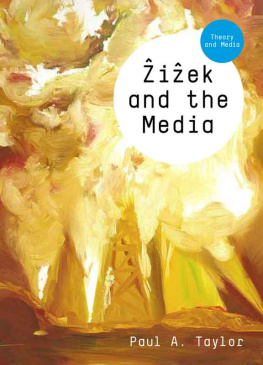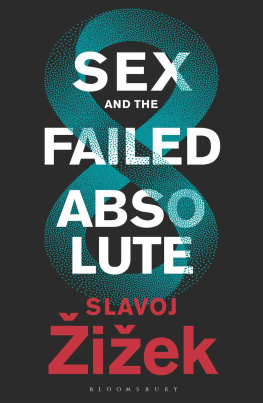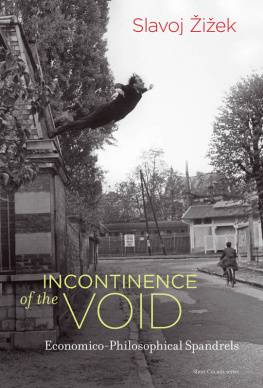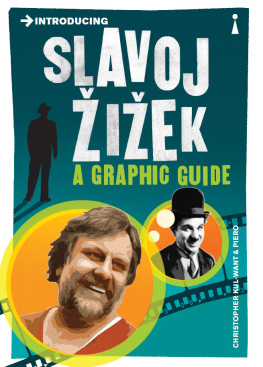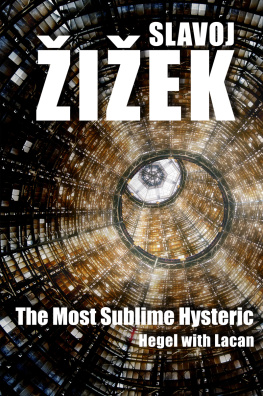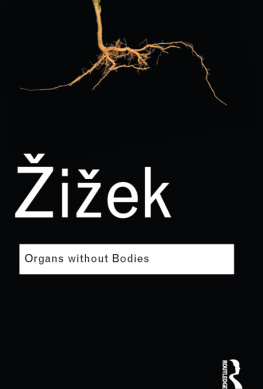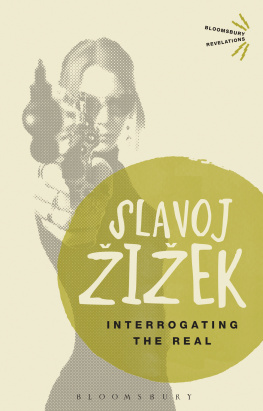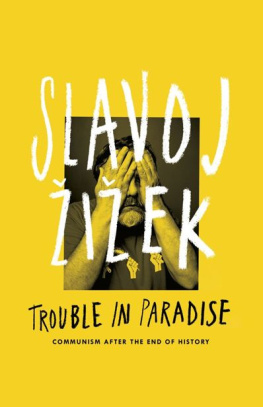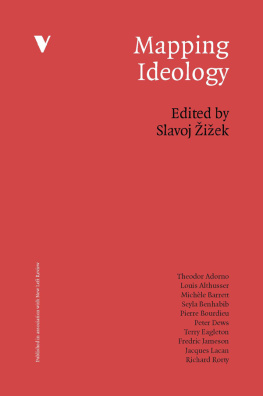Contents
This eBook is licensed to John Brown, vlthmfuwrmefxonbsy@etochq.com on 10/22/2020
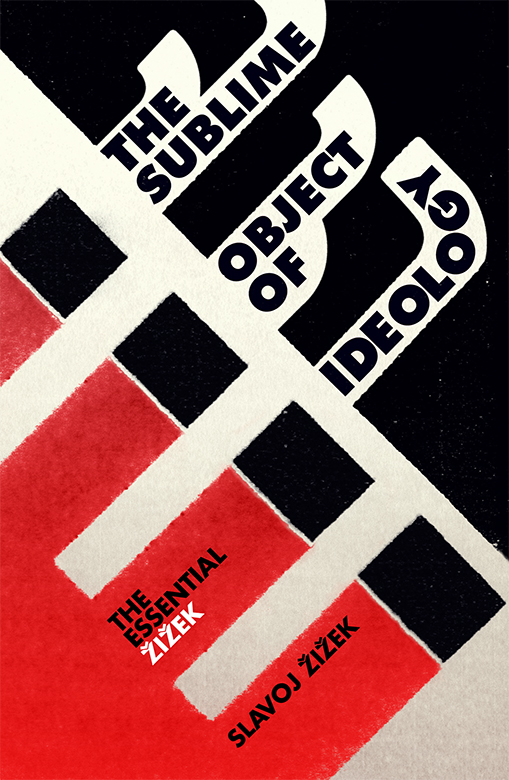
Slavoj iek was born in Ljubljana, Slovenia, in 1949, and is a professor at the European Graduate School, International Director of the Birkbeck Institute for the Humanities, Birkbeck College, University of London, and a senior researcher at the Institute of Sociology, University of Ljubljana. He has been a visiting professor at Columbia University, New York, and the University of Paris VIII, as well as at a number of other prestigious institutions on both sides of the Atlantic.
In his home country, he was a prominent political figure in the 1980s. He wrote a regular column for the newspaper Mladina and, in 1990, finished fifth in the election for Slovenias four-person presidency. His international reputation as a writer and philosopher was secured in 1989 with the publication of The Sublime Object of Ideology, a book which applied the authors pioneering distillation of Lacan, Hegel and Marx to an analysis of agency and modern ideology. A string of much lauded works have followed, including For They Know Not What They Do (1991), The Ticklish Subject (1999), Welcome to the Desert of the Real (2002), The Parallax View (2006) and In Defense of Lost Causes (2008).
As well as providing original insights into psychoanalysis, philosophy and radical political theory, he has, through employing his extraordinary scholarship to the examination of popular entertainment, established himself as a witty and deeply moral cultural critic. He has been the subject of two feature-length documentaries, Slavoj iek: The Reality of the Virtual (2004) and iek! (2005). He also presented and wrote the three-part British TV documentary A Perverts Guide to Cinema (2006).
His compelling, charismatic presence and puckish sense of the absurd have prompted the press to dub him the Elvis of cultural theory and an intellectual rock star. However, these jocular monikers belie a seriousness of purpose that has been nothing short of startling in an era marked by despondency and disengagement on the Left. More than an academic or theorist, iek has the gravitas and drive of a breed once thought extinct: the revolutionary. He has made philosophy relevant again for a whole generation of politically committed readers.
A series of classic philosophical texts from Verso
The four pillars of Slavoj ieks work are (Lacanian) psychoanalysis, (Hegelian) philosophy, a (Marxist) theory of ideology, and (Christian) theology. The structure of this scholarly edifice is mapped out in the titles of The Essential iek, four central interventions into each of these fields. The focus of The Sublime Object of Ideology is the importance of Lacans work to philosophy and contemporary political struggle; The Ticklish Subject examines German Idealism and the unsurpassable horizon of our thinking; The Plague of Fantasies anatomizes the ideological mechanisms that shape our daily experience; and The Fragile Absolute explores the emancipatory core of Christianity.
Also available from Verso by the same author:
In Defense of Lost Causes
Welcome to the Desert of the Real
Iraq: The Borrowed Kettle
Revolution at the Gates, iek on Lenin: The 1917 Writings
Lacan: The Silent Partners
This eBook is licensed to John Brown, vlthmfuwrmefxonbsy@etochq.com on 10/22/2020
THE SUBLIME OBJECT
OF IDEOLOGY

SLAVOJ IEK

This eBook is licensed to John Brown, vlthmfuwrmefxonbsy@etochq.com on 10/22/2020
First edition published by Verso 1989
This edition published by Verso 2008
Slavoj iek 1989
All rights reserved
20 19 18 17 16 15 14 13 12 11 10
Verso
UK: 6 Meard Street, London V1F 0EG
US: 20 Jay Street, Suite 1010, Brookyn, NY 11201
Verso is the imprint of New Left Books
ISBN-13: 978-1-84467-300-1
ISBN-13: 978-1-78960-437-5 (UK EBK)
ISBN-13: 978-1-78960-436-8 (US EBK)
British Library Cataloguing in Publication Data
A catalogue record for this book is available from the British Library
Library of Congress Cataloging-in-Publication Data
A catalog record for this book is available from the Library of Congress
Typeset by Hewer UK Ltd, Edinburgh
Printed in the US by Maple Vail
This eBook is licensed to John Brown, vlthmfuwrmefxonbsy@etochq.com on 10/22/2020
Contents
This eBook is licensed to John Brown, vlthmfuwrmefxonbsy@etochq.com on 10/22/2020
Preface to the New Edition:
The Ideas Constipation?
When a discipline is in crisis, attempts are made to change or supplement its theses within the terms of its basic framework a procedure one might call Ptolemization (since when data poured in which clashed with Ptolemys earth-centred astronomy, his partisans introduced additional complications to account for the anomalies). But the true Copernican revolution takes place when, instead of just adding complications and changing minor premises, the basic framework itself undergoes a transformation. So, when we are dealing with a self-professed scientific revolution, the question to ask is always: is this truly a Copernican revolution, or merely a Ptolemization of the old paradigm?
Two examples of Ptolemization: there are good reasons to claim that string theory, which claims to provide the foundations for a unified theory (a single theoretical framework describing the four fundamental interactions between subatomic particles that were previously explained separately by relativity theory or quantum physics), remains an attempt at Ptolemization, and that we are still waiting for a new beginning which will require an even more radical change in the basic presuppositions (something like abandoning time or space as the basic constituent of reality).all the new paradigm proposals about the nature of the contemporary world (that we are entering a post-industrial society, a postmodern society, a risk society, an informational society ) remain so many Ptolemizations of the old paradigm of classic sociological models.
The question is then: how do things stand with psychoanalysis? Although Freud presented his discovery as a Copernican revolution, the fundamental premise of the cognitive sciences is that psychoanalysis remains a Ptolemization of classical psychology, failing to abandon its most basic premises. (Post-classical economists, incidentally, make the same claim about Marx: his critique of Smith and Ricardo amounts to a Ptolemization.) The Sublime Object of Ideology tries to answer this question by way of rehabilitating psychoanalysis in its philosophical core as a theory indebted to Hegels dialectics and readable only against this background. This cannot but appear, perhaps, as the worst possible move to have made: trying to save psychoanalysis, a discredited theory (and practice), by reference to an even more discredited theory, the worst kind of speculative philosophy rendered irrelevant by the progress of modern science.
However, as Lacan taught us, when we are confronted with an apparently clear choice, sometimes the correct thing to do is choose the worst option. Thus my wager was (and is) that, through their interaction (reading Hegel through Lacan and vice versa), psychoanalysis and Hegelian dialectics may simultaneously redeem themselves, shedding their old skins and emerging in a new unexpected shape.

